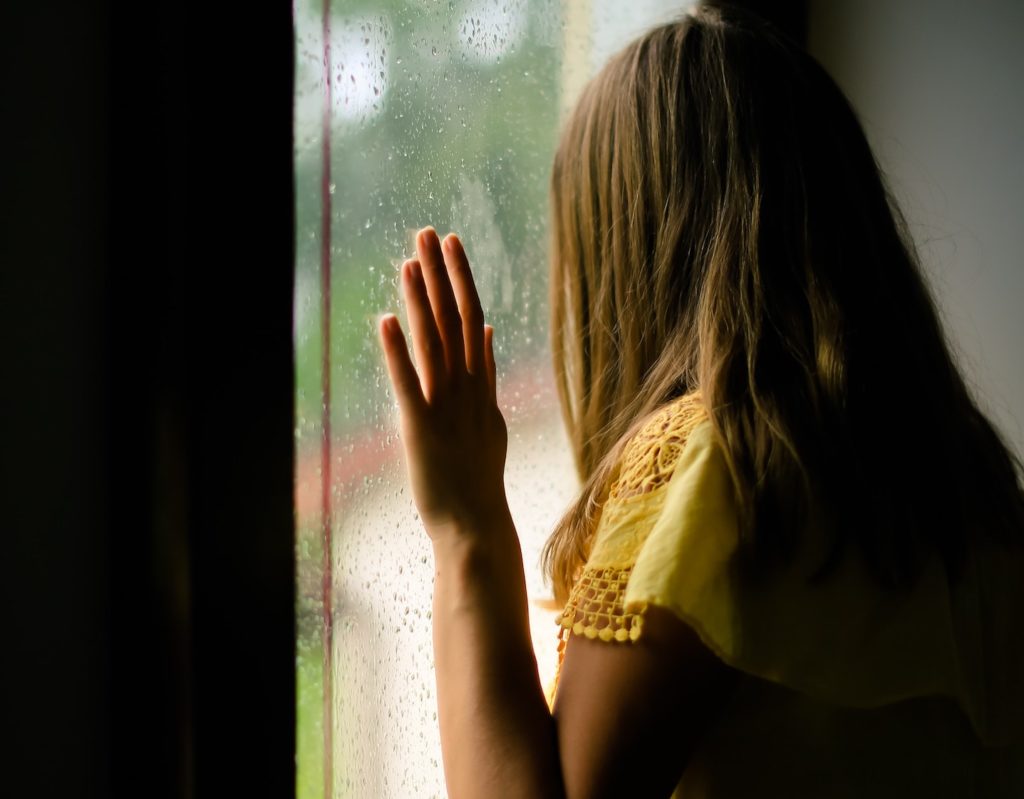
The stress of a global pandemic and economic downturn combined with isolating conditions within the home spell out a disastrous recipe for increased family conflict and domestic violence in Singapore, and elsewhere
Since Singapore implemented the Circuit Breaker in early April, the Ministry for Social and Family Development has received more referrals and inquiries relating to domestic conflicts than before the start of the CB period. This has followed a global pattern of increased reports of domestic violence. As the United Nations points out,
“For too many women and children, home can be a place of fear and abuse. That situation worsens considerably in cases of isolation, such as the lockdowns imposed during the COVID-19 pandemic.”
We recently spoke with Laura Meehan, Senior Programme Coordinator for the Women’s Care Centre at AWARE, to find out what steps women in Singapore can take to ensure their physical and mental safety. AWARE is Singapore’s leading gender equality advocacy group, and runs an emergency hotline for women, in addition to a Sexual Assault Care Centre hotline.
While AWARE is only operating on a remote basis during the Circuit Breaker, they did provide advice on physical shelters women can seek out in an emergency. We also spoke with family lawyer Shu Mei Hoon for further advice both for women and for mothers, and steps that YOU can take if you are concerned that a neighbor or friend is in danger.

What is the first thing a woman should do in an emergency situation? Whom should she call?
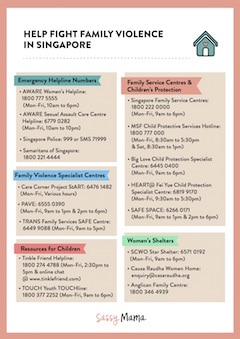
Women can access AWARE’s Women’s Care Centre and Sexual Assault Care Centre services, such as counselling, free legal clinic and case management support for survivors of sexual violence. However they should note that our services have gone remote (i.e. phone or video calls), though we continue to provide face-to-face support services for urgent and high-risk cases on a case-to-case basis.
Our Helplines are still operating. Not that we also have a call-back request form for anyone who cannot get through on the Helpline:
- Women’s Helpline: 1800 777 5555 (Mon–Fri, 10am–6pm)
- Sexual Assault Care Centre Helpline: (+65) 6779 0282 (Mon–Fri, 10am–10pm)
- Workplace Harassment and Discrimination Advisory: (+65) 6950 9191 (Mon-Fri, 10am-6pm)
If they are experiencing thoughts of suicide they can reach out to the Samaritans of Singapore helpline on 1800 221 4444, which runs 24/7.
If you or your child(ren) are in immediate danger (particularly outside the helpline hours), you can call the police at 999 or go to the nearest neighbourhood police post or centre for help. Where you are not able to speak, or it is unsafe to call ‘999’ and emergency assistance is required or needed, send a brief SMS message 71999 containing information on the nature of the emergency and the location where it is happening or happened. Depending on the type of emergency reported, police, ambulance or fire rescue personnel may be despatched.
It is important that evidence of the alleged family violence be obtained and documented, even if you do not wish to take any action against the abuser. You should file a police report or seek medical treatment to have your injuries treated as well as documented as evidence of the abuse. It was recently held by Court that contemporaneous police or medical records of the family violence should be accorded due weight as the applicant would not have had the opportunity to fabricate the incident or his or her injuries in the circumstances. This case emphasises the need and importance of creating proper contemporaneous records in a timely manner.
What are other resources for combating family violence in Singapore, such as Family Service Centres?
Family Service Centres are based in the community to provide help and support to individuals and families in need, with 47 FSCs located in HDB towns around Singapore. They are staffed by social service professionals and supported by the Ministry of Social and Family Development, the National Council of Social Service, and the Singapore Totalisator Board. Callers can find out their closest FSC by calling ComCare on 1800 222 0000.
In addition there are family violence specialist centres such as the Care Corner Project StART (CCPS), PAVE and Trans SAFE Centre for help. You may also contact the Child Protective Service Helpline at 1800-777 0000.
In addition, there are specialised community-based agencies such as Big Love Child Protection Specialist Centre and HEART@Fei Yue Child Protection Specialist Centre that work with families with child protection concerns. They provide community-based intervention to keep children safe within their families.
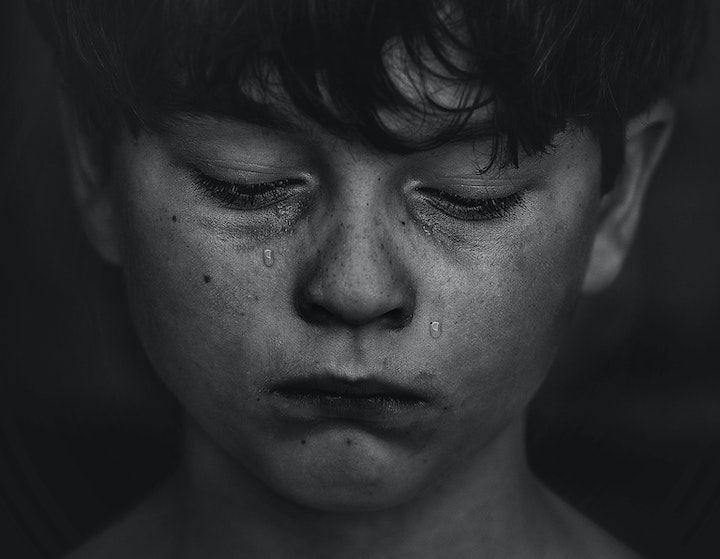
Are there any shelters women and children can still visit in an emergency despite the circuit breaker’s stay-home restrictions?
Crisis shelters are open. Social service agencies can refer callers to the crisis shelter, while also ensuring that the callers are physically healthy.
There are available shelters such as the SCWO Star Shelter, Casa Raudha Women Home and Anglican Family Centre which provide temporary refuge for women and their children who are victims of family violence. To protect the victims in the shelter, the location of the shelters are usually confidential.
These shelters are likely to continue to operate during the “circuit breaker” period for women and children who are experiencing family violence and in need of assistance.
While there is sufficient space in crisis shelters to house victims of violence and contingency plans to ramp up capacity to cope with the expected rise in family violence as circuit breaker measures are in force, the Ministry of Social and Family Development (MSF) has announced that it is constantly monitoring the utilisation of the capacity in each crisis shelter and will activate contingency measures to provide alternative accommodation for family violence victims.
Transitional shelters provide temporary and safe accommodation to help families and individuals to cope with their challenges and transition towards self-reliance. At present, there are three social service agencies that run these Transitional shelters. They are AMKFSC Community Services Ltd, AWWA Ltd and New Hope Transitional Shelter for Families in Crisis.
Are there any mitigating steps a woman can take within the home to protect herself/her children?
It may help to formulate a safety plan, which allows someone to visualise the steps she could take in an emergency. This can include a safe place where you can go, an excuse to give to the abuser, a code or signal to allies, a secret stash of emergency money, and to keep a physical list of important numbers she could call for assistance.
Where possible, victims may consider reaching out to trusted family / friends or neighbours to inform them of the situation at home, so that they can be quickly activated for assistance in the event of emergency.
Victims should also be prepared to leave the home at short notice when facing danger, by keeping a small emergency fund for transport and keeping your mobile phone at hand (if possible). An emergency bag (containing some essential belongings and cash) can be kept at a trusted relative’s or friend’s home if it becomes necessary to leave the home.
AWARE suggests that the following be kept in the emergency bag:
- Some form of identification
- Birth certificates
- Passports, visas and work permits
- Money, bankbooks, cheque book, credit and debit cards
- Keys for house, car, and place of work. (Get an extra set of keys cut, and put them in the emergency bag)
- Driving license and car registration documents, if applicable
- Prescribed medication
- Address book
- Clothing and toiletries
- Any documentation relating to the abuse – e.g. police reports, court orders and copies of medical records if any
If attacked, avoid places in the home where there are likely to be knives or items that can be used as weapons. The victim should take all opportunities possible to leave the home and not become trapped in rooms (e.g. bathroom or small spaces like cupboards) where there is no escape route. Try to use a mobile phone to record any threats or abuse happening. If you are concerned about your safety, make a report, or seek help at one of the centres mentioned above.
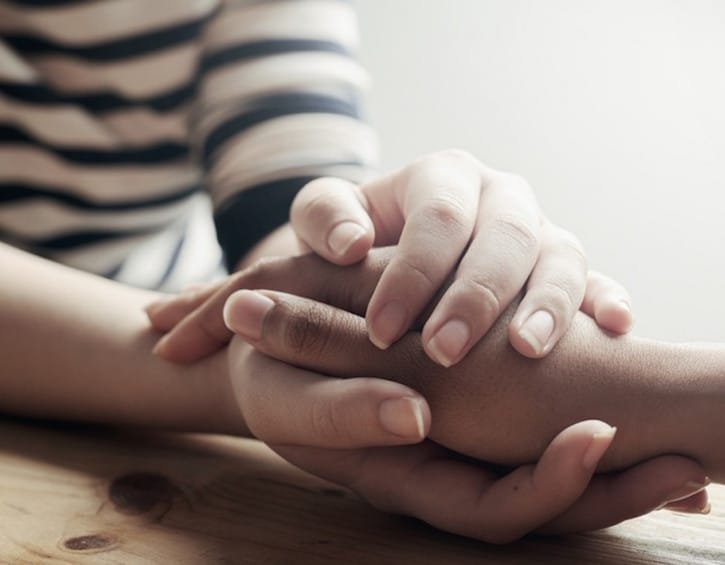
What can neighbors or friends do to help without potentially exacerbating the situation?
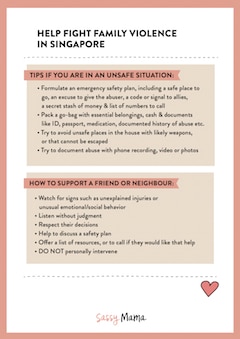
Look out for signs such as: unexplained injuries or bruises; unusual emotional displays (of anxiety, depression, anger, worry or confusion); unusual social behaviour such as avoiding others; financial trouble or unusual behaviour at work such as absence, tardiness or a noticeable change in performance.
If they are safe to do so and feel comfortable, neighbours can listen to the person’s problems without judgment, and let them know that they are not alone. Regardless of their circumstance, they do not deserve to be abused. Respect their decisions—often the family members facing violence are economically dependent on the offender and it is not easy for them to leave their homes. It would not be useful to suggest to the victim to work harder on their relationship with the abuser, or to assume things will get better, as the violence may escalate. On the other hand, do not stop them from leaving home if they have decided to do so.
Again if they feel comfortable with this, help to discuss a safety plan and identify what resources and options a person has. Offer information on available resources (e.g. helplines and FSCs). Offer to help call the police or a Family Violence Specialist Centre, or to accompany them to the police post, FSC, hospital, counselling centres or crisis shelter.
Neighbours should not personally intervene as it may create greater danger for the victim or to the neighbour. If a victim reaches out for help, listen to them without judgement and respect their decision as to whether they wish to seek further help or take the matter further.
If uncertain of what to do, neighbours can reach out to Child Protective Service Helpline 1800-777 0000, or one of the Child Protection Specialist Centres (Big Love, HEART@Fei Yue and Safe Space) or Family Violence Specialist Centres (PAVE, TRANS SAFE Centre and Care Corner Project StART). See the MSF for more information. It is possible for a concerned party to call the CPS whilst remaining anonymous. Child Protection Services and Family Violence Specialist Centres remain as essential services during the circuit breaker and so it may be expected that they are adequately staffed.
Finally, children who need support can call Tinkle Friend (1800 2744 788), a service provided by the Singapore Children’s Society.
Shu Mei, what further legal steps can women take against an abuser?
After departing from the home, you may wish to seek a personal protection order (PPO) against the abuser. The court may, if satisfied that family violence has been committed, and it is necessary for your protection, grant a PPO restraining the abuser from using further family violence on you.
It is also possible to obtain an expedited order (EO) if the court is satisfied as to the imminent danger of family violence. An EO is valid for 28 days and may be extended.
When granting a PPO, the court can also grant a domestic exclusion order (DEO) which gives the right of exclusive occupation of a property or part of a property to a protected person or refer the abuser to attend counselling.
If the PPO, EO or DEO is breached, the abuser shall be guilty of a criminal offence and shall be liable to a fine not exceeding $2,000 or imprisonment not exceeding 6 months or both. As it is seizable offence, the police may arrest the abuser without a warrant.
You may apply for a PPO in person at the Family Justice Courts, online via the Integrated Family Application Management System (iFAMS), or at the family violence specialist centres.
Although PPOs are provided for in the “Women’s Charter”, it applies to all family members, and would include protection for men as well.
In light of the “circuit breaker” initiative to curb further spread of COVID-19 from 7 April 2020 to 1 June 2020 (“Relevant Period”), applicants are strongly encouraged to reserve an appointment slot before attending physically at the family violence specialist centres or the Family Justice Courts for the filing of their complaint. Applicants will affirm their complaints over video link from the Family Protection Centre at the Family Justice Courts or the family violence specialist centres. Where affidavit or documentary evidence needs to be tendered, it shall be deposited in a physical drop box at the entrance of Family Justice Court’s premises at 3 Havelock Square, in lieu of tendering to the Court in person.
During the Relevant Period, the Family Justice Courts will hear only urgent and essential matters. In general, these comprise matters which are time sensitive, constitute a threat to life and liberty and/or involve urgent needs of the family. These matters, as well as matters before the Duty Judicial Officer, will be conducted by video conferencing to the maximum extent possible, including for cases involving litigants-in-person.
For family violence proceedings (including mentions and hearings), proceedings will be adjourned for at least 4 weeks and where an EO has been granted, the EO will be extended without the need for an application. Matters involving a higher risk of imminent danger will continue to be heard. For such cases, hearings will be conducted by video conferencing as far as possible.
Counselling for family violence proceedings will continue as they do not require attendance in Court or preparatory work by parties and will generally be provided by telephone conferencing or video conferencing. The Court may also, taking into account the urgency of the case and the welfare and vulnerability of the child, conduct child interviews and/or custody/access evaluation by video conferencing.
Consequential proceedings such as reviews for Mandatory Counselling Orders and show cause hearings for bailors will be adjourned for at least 4 weeks.
It is important for financially reliant wives (and their children) to remember that they can seek maintenance from their spouses, too.
The term “stay home” should not prevent victims of family violence to stay silent and tolerate abuse. Instead, it is advisable for them to seek help immediately, whether directly from the Family Justice Courts, a Child Protective / Family Violence Specialist Centre or get in touch with a family lawyer. If you are a concerned neighbour, friend, or family member, it is better to be cautious and report any concerns rather than remain silent.






 View All
View All





 View All
View All











 View All
View All







![𝗙𝗜𝗥𝗦𝗧 𝗟𝗢𝗢𝗞] 𝗡𝗲𝘄 ‘𝗟𝗼𝘀𝘁 𝗜𝘀𝗹𝗮𝗻𝗱’ 𝗣𝗹𝗮𝘆𝘀𝗽𝗮𝗰𝗲 𝗢𝗽𝗲𝗻𝘀 𝗔𝘁 𝗧𝗵𝗲 𝗔𝗿𝘁𝗴𝗿𝗼𝘂𝗻𝗱
Ahoy, little adventurers! The Artground invites kids aged 9 and under to unleash their imagination and uncover the stories of lost islands inspired by Indonesia. This whimsical landscape is filled of hands-on activities, role-playing games and mythical creatures. Here, kids can create their own stories and discover cultural heritage through play.
Kids can head to The Marketplace, where they can learn about financial literacy through role-playing activities. As they trade, they will get to explore key concepts like saving, spending and managing money.
𝗪𝗵𝗮𝘁 𝘄𝗲 𝗹𝗼𝘃𝗲:
- Our kids loved the slides and stuffed animals that they could use to create stories.
- There are endless ways to play and bond with the kids.
- The ticketed sensory workshop is very engaging and sparks kids’ imaginations.
𝗪𝗵𝗮𝘁 𝘁𝗼 𝘁𝗮𝗸𝗲 𝗻𝗼𝘁𝗲 𝗼𝗳:
- Some parts of the floor are incredibly slippery, so we highly recommend anti-slip socks for kids (and adults if you have them!)
- You only get 75 minutes to play, so be sure to make the most of it!
- The slides are incredibly fast and slippery, so keep an eye on your little ones for safety.
𝗪𝗵𝗲𝗻: Open daily, 9:15am - 6pm
𝗪𝗵𝗲𝗿𝗲: The Artground at Goodman Arts Centre, 90 Goodman Road, #01-40 Block J, Singapore 439053
𝗛𝗼𝘄 𝗺𝘂𝗰𝗵: $5 per person (weekdays), $5 per child (weekends) and $8 per adult (weekends)
Comment ‘Artground’ or tap the link in bio for all the deets!
.
.
.
.
.
#theartground #indoorplayground #goodmanartscentre #sgkids #sgparents #indooractivity #sensoryplay #batik #indonesianislands](https://www.sassymamasg.com/wp-content/plugins/instagram-feed/img/placeholder.png)
